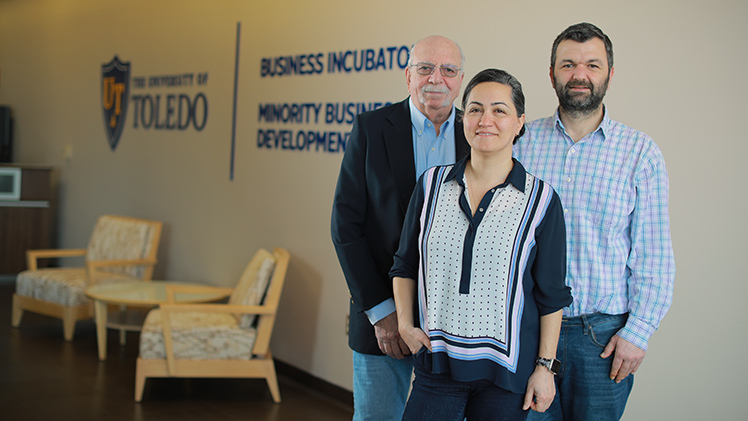As researchers increasingly set their sights on space, University of Toledo-developed technology is poised to bring costs back down to Earth.
Dr. Eda Yildirim-Ayan, an associate professor in the Department of Bioengineering, and Dr. Halim Ayan, an associate professor in the Departments of Bioengineering and Mechanical, Industrial and Manufacturing Engineering, are the inventors behind the company Altered Gravity, LLC. It’s built around a prototype they developed to simulate partial gravity conditions like those found on the low Earth orbit, moon or Mars, which are attractive to researchers running experiments in a wide variety of fields.

From left, Norm Rapino, executive director of Rocket Innovations, Dr. Eda Yildirim-Ayan, an associate professor in the Department of Bioengineering, and Dr. Halim Ayan, an associate professor in the Departments of Bioengineering and Mechanical, Industrial and Manufacturing Engineering.
Yildirim-Ayan and Ayan see their Biomimetic Engineered Space Technology as a means of making partial gravity experimentation more accessible than it currently is, given the limited availability and prohibitive cost of working with facilities like the International Space Station.
“This technology is going to open up a slew of new opportunities for researchers,” said Norm Rapino, executive director of Rocket Innovations, an investment fund set up to advance student and faculty entrepreneurship, who works with Yildirim-Ayan and Ayan on Altered Gravity, LLC. “It’s going to allows us to do space experiments at Earth costs.”
Altered Gravity, LLC, recently received $200,000 through the Ohio Third Frontier Technology Validation and Start-up Fund of the Ohio Department of Development that provides grants to Ohio companies aiming to license institution-owned technologies to accelerate commercialization through activities such as market research and further prototyping.
Altered Gravity is one of two UToledo-developed technologies to receive such funding in 2024. Avani Enterprizes, based on a novel polypropylene recycling technology, also was awarded $200,000.
Yildirim-Ayan and Ayan said the funding will be significant in moving their technology forward including developing additional prototypes and preparing their device for the market.
Scientific processes work differently outside of the gravitational pull of Earth, which is largely what makes partial gravity experimentation so attractive. Crystals grown in microgravity are often larger and more perfectly structured than those grown on Earth, for example, a phenomenon that researchers have explored for applications as varied as drug development and metal manufacturing.
“Space-based industries are also taking off, which means that we’re going to see more and more humans in space,” Ayan said, identifying another impetus behind the demand for partial-gravity experimentation. “This means researchers are invested in learning how microgravity affects things like physiology, drug efficacy and disease progression.”
Astronauts have conducted more than 3,000 experiments aboard the International Space Station since its launch in 1998, but limited resources and high cost prevent the average researcher from following their hypotheses all the way to the thermosphere. Altered Gravity is poised as an alternative, particularly for biomedical research into samples as small as cells and as large as musculoskeletal organs.
“We’ve proven that we can effectively simulate partial gravity with our prototype,” Yildirim-Ayan said. “Scientists won’t need to send experiments into space to achieve these conditions. Or if they decide to go to space anyway, they’ll be able to run preliminary experiments with our device so that they’re optimizing their resources when they continue their research at the International Space Station.”
Their prototype is a type of random positioning machine, which they said stands out in a narrow field of competitors in the types of samples it can accommodate and its ability to reach a targeted gravity in less than a minute and a half. It’s designed to conduct experiments and drug efficacy studies with three-dimensional tissues, tissue analogs and ex-vivo organs.
UToledo is licensing the patent-pending technology.
Yildirim-Ayan and Ayan have been developing their device since 2020, supported by resources and funding through the National Science Foundation’s Innovation Corps in 2021. The Innovation Corps is an entrepreneurial training program that prepares participants to take their ideas and technology beyond the laboratory and into the world, and UToledo is an officially designated I-Corps Site.
Yildirim-Ayan and Ayan also received a National Science Foundation Partnerships for Innovation – Technology Translation grant in 2022, and ongoing support through the UToledo Business Incubator.
“We’re excited about the most recent award from Ohio Third Frontier,” Yildirim-Ayan said. “This funding is going to be crucial for us as to we take the next steps toward commercialization.”